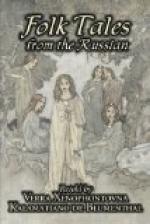But the Simpleton did not even answer; he only waved his hand. The three brothers continued to live their usual life, the two with cleverness and the younger with foolishness. They lived a day in and an equal day out. But one morning there came quite a different day from all others. They learned that big men were going all over the country with trumpets and players; that those men announced everywhere the will of the Tsar, and the Tsar’s will was this: The Tsar Pea and the Tsaritza Carrot had an only daughter, the Tsarevna Baktriana, heiress to the throne. She was such a beautiful maiden that the sun blushed when she looked at it, and the moon, altogether too bashful, covered itself from her eyes. Tsar and Tsaritza had a hard time to decide to whom they should give their daughter for a wife. It must be a man who could be a proper ruler over the country, a brave warrior on the battlefield, a wise judge in the council, an adviser to the Tsar, and a suitable heir after his death. They also wanted a bridegroom who was young, brave, and handsome, and they wanted him to be in love with their Tsarevna. That would have been easy enough, but the trouble was that the beautiful Tsarevna loved no one. Sometimes the Tsar mentioned to her this or that one. Always the same answer, “I do not love him.” The Tsaritza tried, too, with no better result; “I do not like him.”
A day came when the Tsar Pea and his Tsaritza Carrot seriously addressed their daughter on the subject of marriage and said:
“Our beloved child, our very beautiful Tsarevna Baktriana, it is time for thee to choose a bridegroom. Envoys of all descriptions, from kings and tzars and princes, have worn our threshold, drunk dry all the cellars, and thou hast not yet found any one according to thy heart’s wish.”
The Tsarevna answered: “Sovereign, and thou, Tsaritza, my dear mother, I feel sorry for you, and my wish is to obey your desire. So let fate decide who is destined to become my husband. I ask you to build a hall, a high hall with thirty-two circles, and above those circles a window. I will sit at that window and do you order all kinds of people, tsars, kings, tsarovitchi, korolevitchi, brave warriors, and handsome fellows, to come. The one who will jump through the thirty-two circles, reach my window and exchange with me golden rings, he it will be who is destined to become my husband, son and heir to you.”
The Tsar and Tsaritza listened attentively to the words of their bright Tsarevna, and finally they said: “According to thy wish shall it be done.”
In no time the hall was ready, a very high hall adorned with Venetian velvets, with pearls for tassels, with golden designs, and thirty-two circles on both sides of the window high above. Envoys went to the different kings and sovereigns, pigeons flew with orders to the subjects to gather the proud and the humble into the town of the Tsar Pea and his Tsaritza Carrot. It was announced everywhere that the one who could jump through the circles, reach the window and exchange golden rings with the Tsarevna Baktriana, that man would be the lucky one, notwithstanding his rank—tsar or free kosack, king or warrior, tsarevitch, korolevitch, or fellow without any kinfolk or country.




